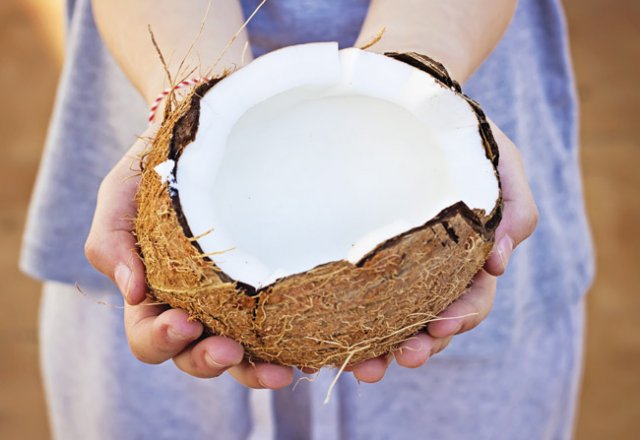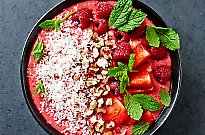
Which diet will work for you?

We review the latest eating fads
Whether you like the sound of Pete Evans and his paleo way or want to quit sugar with Sarah Wilson, there is no time like the present to try out a new eating plan.
Gluten free
Though it was once only an issue for people suffering from coeliac disease, these days gluten is at the top of the diet chopping block. With gluten intolerance at record highs, the wheat-based protein has become synonymous with inflammation, infertility, bloating and bad gut health.
What can I eat? Anything that does not contain wheat or gluten.
What’s good about it? Even in those with non-coeliac gluten sensitivity, removing it 100 per cent from the diet has been shown to help balance hormones and mood, aid digestion, reduce severity of migraines and inflammation, improve sleep and mental clarity, and help with chronic fatigue, depression, anxiety and fertility.
Watch out for: Gluten-free alternatives are often made from high glycaemic index grains such as corn and rice, so keep an eye on your sugar intake.
Raw
Paleo may have been the hottest diet trend of 2014, but the rawvolution, it seems, has arrived; and it’s stamping its unadulterated flavour on everything from naked wedding cakes and raw slices to dehydrated cashew cheese.
No longer the fodder of hippies and health freaks, the uncooking craze – in which food is not heated above 46 degrees – is finding its way onto supermarket shelves and café menus across the country, with a social media surge propelling it well and truly into the mainstream.
It’s also infiltrated the manufacturing market, and many companies are now turning down the heat to make sure their products comply with the raw food movement.
WHY GO RAW? Raw foodists assert that heat changes the molecular structure of food therefore destroying or damaging its nutritional content. Studies have found that consuming living enzymes (or raw food) can help conserve the body’s energy, reduce disease-causing stress and support a healthier digestive system.
What can I eat? Purists eat raw (often organic) fruits, vegetables, nuts, seeds, sprouted grains and plants. Less hardcore followers eat raw eggs, meat, fish and unpasteurised dairy products. ANH does not endorse the consumption of raw milk (or bath milk), which is illegal in Australia, and has recently caused the death of a toddler in Victoria.
What’s good about it? A raw food diet can help improve headaches, clear allergies, boost immunity and memory, aid digestion, stabilise blood sugar and improve arthritis and diabetes.Raw foods are generally low in calories, fat and sodium, and high in fibre, which is said to aid weight loss, and the high antioxidant intake is also believed to help clear skin and slow the ageing process.
What do I need? If you want to go all out: a spiraliser, high-speed blender and dehydrator.
Watch out for: Raw food may be healthy, but it is extremely nutrient dense – particularly if you are filling up on nuts and raw treats. The high soluble fibre content often sees people who are new to the raw food regimen initially have trouble digesting the extra roughage, so to avoid issues such as gas and constipation, gradually increase raw food intake. Also keep an eye on your protein, iron, calcium, and other vitamins and minerals such as B12 as raw foodies are often lacking these essential minerals.
Paleo / Caveman / Clean eating
Thanks to the likes of Pete Evans and Gwyneth Paltrow, the Paleo lifestyle is at the top of the diet food chain. Devout devourers of the grain-and-refinement-free food plan say if our cave-dwelling forefathers didn’t eat it, then neither should we.
What can I eat? Grass-fed meats, fish and seafood, fresh fruits and non-starchy vegetables, eggs, nuts, seeds, and healthy oils (olive, walnut, flaxseed, macadamia, avocado, coconut).
Avoid: Grains (including corn), legumes (including peanuts), refined sugar, potatoes, processed foods, refined oils.
What’s good about it? Adopting a primal palate means cutting out refined foods and processed sugars. Many people adopt the lifestyle to take control of their health, lose weight and reduce the severity of lifestyle illnesses such as type 2 diabetes and cardiovascular disease. A paleo diet can also help to reduce bloating, balance hormones, improve sleep and mental function, and restore gut health.
Watch out for: Given the low dairy and carbohydrate content of the hunter-gatherer diet, you may need to watch your calcium intake and keep your fat levels in check.
Candida
The candida diet is about reducing an overgrowth of candida albicans in the gut. Candida pathogens release up to 79 different byproducts, including uric acid and acetaldehyde – a powerful neurotoxin that causes chronic headaches and brain fog. A candida imbalance is most often caused by antibiotics, eating a high-sugar diet and chronic stress. Modern lifestyles have seen candida diets enter the mainstream as stress and adrenal fatigue put added strain on the gut.
What can I eat? Fresh fruit and vegetables, lean meats, oily fish, gluten-free grains, herbs and spices, probiotics.
Avoid: Processed sugars, alcohol, gluten, some vegetables (such as potatoes and peas), processed meat, dairy, additives and preservatives, most fats and oils, certain nuts and legumes, vinegar.
What’s good about it? Since candida yeast feed on sugar, the aim of the candida diet is to remove refined sugars from the diet, therefore starving them. This enables the gut to heal and regain its balance of good bacteria.
Watch out for: This can be a hard diet to maintain long term. Consult your doctor before taking a course of action.
Vegan
This lifestyle diet has gained incredible momentum over the last decade, and with A-list celebrity ambassadors including Ellen DeGeneres, Jennifer Lopez, Brad Pitt and Ricky Martin on the animal-free regime, it shows no signs of slowing down in 2015.
Veganism began as a philosophy that rejects the killing of animals as a commodity, but has become popular for its overall health benefits.
What can I eat? Anything that is not an animal product. That means no meat, fish, eggs, dairy or any other animal bi-products, such as honey.
What’s good about it? Many people ‘go vegan’ to detox and give their systems a break from refined foods and fatty animal products. Studies have shown adopting a vegetarian or vegan lifestyle can lower cholesterol, decrease risk of heart disease, and aid weight loss. Veganism has also been linked with living longer and decreased risk of cancer and other chronic diseases such as heart disease.
What do I need? Loads of fresh fruit and veg.
Watch out for: Make sure you’re getting enough vitamins A, D and B12, zinc, iron and protein.
Organic
There has been much debate about whether or not organic food is better for your health. And with a barrage of so-called biodynamic, hormone-free, cage-free, free-range, non-GMO and all-natural products lining supermarket shelves, it’s easy to get caught up in the anti-chemical warfare. But what exactly is organic food, and is it really better for us?
What can I eat? According to Australian Certified Organic (ACO) – Australia’s largest certifier for organic and biodynamic produce – for a product to be certified organic it needs to contain at least 95 per cent organic ingredients certified under several international standards. To gain the certified organic stamp, foods must not be treated with synthetic pesticides, herbicides or fertilisers, and not subjected to sewage sludge, bioengineering, genetic modification or ionising radiation.
What’s good about it? Though studies haven’t conclusively shown organic means more nutritious, at the very least – eating organic foods will relieve the chemical burden we place on our bodies. Organic food is also more fresh, has lower food miles and is better for the environment.
Where can I buy organic food? Though supermarkets do sell organic produce, the range is limited, and often expensive. Try shopping at local farmer’s markets and health food stores.
Watch out for: Organic food can come with a hefty price tag. If you can’t afford to go the whole hog, put these dirty dozen at the top of your organic shopping list: apples, capsicums, blueberries, celery, grapes, cucumbers, lettuce, nectarines, peaches, potatoes, strawberries and spinach. Everything else, wash before eating.
Sugar free
Between David Gillespie’s Sweet Poison and Sarah Wilson’s I Quit Sugar, the recent onslaught of saccharine slamming has seen hundreds of thousands of people jump on board the anti-sweet stuff bandwagon. And the popular paleo-ish diet seems set to dominate in 2015 as well.
What can I eat? Whole foods that are not refined or processed, fresh produce, limited fruit, meat, fish, eggs, healthy fats (such as nuts) and some dairy.
What’s good about it? Research from Princeton University in the US found that intermittent access to sugar was capable of producing a dependency, or, more simple, an addiction. As with any addiction, quitting sugar is no easy feat, but the purported benefits of removing this so-called poison from our systems are many. It can reduce risk of heart disease, cancer and diabetes, reverse signs of ageing, increase energy, stabilise blood sugar, decrease symptoms of depression and anxiety, and aid weight loss, to name a few.
Watch out for: Anti-sugar crusaders advise removing all sugars from your diet, but the brain requires glucose to function optimally. Michael Green of Aston University in England says the brain works best with about 25 grams of glucose circulating in the blood stream — about the amount found in a banana.
Intermittent fasting
Intermittent fasting is not so much a diet but an eating schedule that says skipping one to two meals a day can accelerate weight/fat loss, increase muscle gains and – according to some – cure dozens of lifestyle diseases, including high cholesterol and cancer.
What can I eat? Not what, but when. As a general rule, intermittent fasting means drastically reducing calorie intake a couple of days a week. Or, more simply, skipping meals. The most popular fasting schedule, which has become known as the 5:2 diet, advises eating normally five days a week then cutting calories to one-fourth of your recommended daily calorie requirement – that is 600 for mean and 500 for women – for two. Many people find this easiest to do by fasting overnight and skipping breakfast.
What’s good about it? Fasting is believed to regulate blood sugar and hormones – including ghrelin, the hunger hormone, aid weight loss, increase energy and improve sleep.
Watch out for: Women in particular need to be careful when fasting that they don’t mess their hormones about too much as this can lead to infertility and reproductive issues. Also be mindful that you don’t rebound – or overeat – on the days following a fast.
Mediterranean
Grain lovers rejoice! There’s a new lifestyle diet in town. Mediterranean is the new black, and the holistic eating approach is making the primal palate seem so 2014.
What can I eat? Most things in moderation, but fish, olive oil, whole grains, fresh fruits, vegetables and legumes feature heavily, as well as moderate amounts of lean meat and dairy.
What’s good about it? A recent study by Swinburne University in Victoria found people following a Mediterranean-style diet for just 10 days felt more alert, content and showed better cognitive performance. It also showed small improvements to their heart health.
You might like Low FODMAP diet or Homemade health foods


